Which Essential Oils Are Safe for Cats
Did you know that essential oils can offer numerous benefits for our feline friends when used correctly? This comprehensive guide will help you discover which essential oils are safe for cats and how to use them responsibly to enhance your pet’s well-being.
Key Takeaways
- It is important to use caution when using essential oils around cats, as they require dilution and specific usage methods.
- Tea tree oil should be avoided due to toxicity, while other unsafe oils must be researched beforehand.
- Veterinary guidance is necessary for safe and effective use of essential oils on cats. Almond oil can act as a gentle carrier oil for topical application.
Understanding Essential Oils and Feline Safety
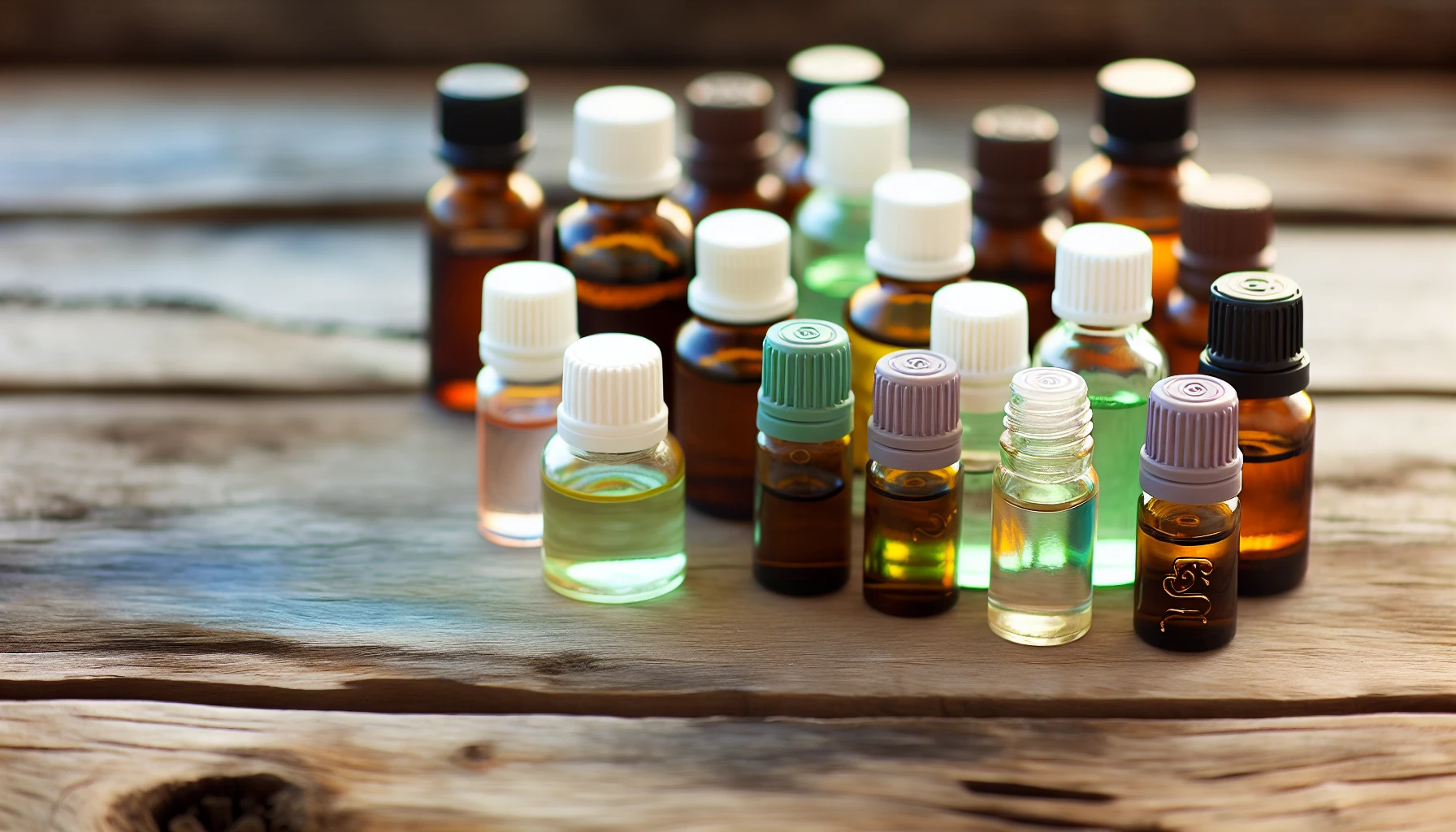
Essential oils, including pure essential oils, are concentrated plant extracts that offer a wide range of health benefits, from reducing stress to providing anti-inflammatory properties. However, it’s necessary to handle certain essential oils carefully around our feline friends because cats are more vulnerable to these oils owing to their absence of specific liver enzymes. This sensitivity makes cats more susceptible to the toxic effects of some essential oils, such as tea tree and mint essential oils.
Before using essential oils on your cat, consider factors such as their size, weight, breed, age, and overall health. Seek advice from scientific research and opt for 100% pure, natural, and organic essential oils to ensure your cat benefits optimally without exposure to unnecessary chemicals or additives.
Navigating the World of Cat-Safe Essential Oils
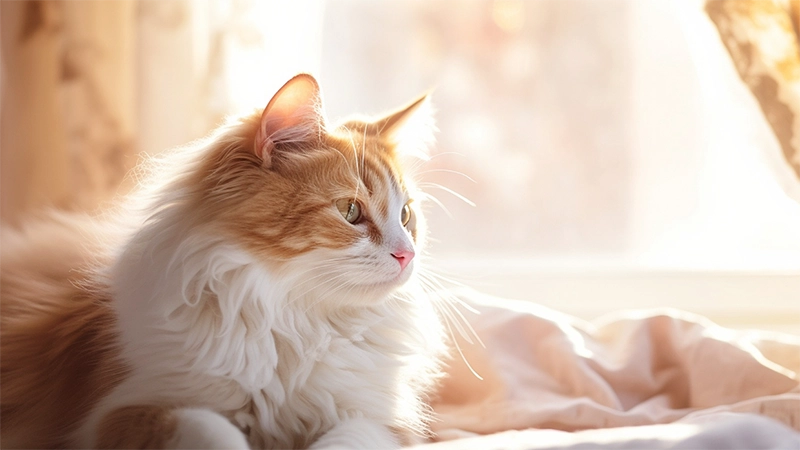
While some essential oils can be toxic to cats, there are also cat-safe essential oils that offer great benefits when used properly. Maintaining correct dilution and safe usage methods is pivotal for your cat’s safety and well-being.
The Importance of Dilution
Mixing essential oils with carrier oils like almond or coconut oil is necessary for safe usage around cats. A common dilution suggestion is a high dilution of 1 drop of essential oil to 4 tablespoons of carrier oil or a low dilution of 2 drops of essential oil to a larger amount of carrier oil. Using undiluted essential oils can be hazardous, especially for cats with respiratory conditions like asthma, as inhaling diffused oils may cause respiratory distress and skin irritation or toxicity if ingested.
The optimal carrier oils for diluting essential oils for cats include coconut oil, almond oil, and V-6 Vegetable Oil Complex. Always monitor your cat for any adverse reactions when using diluted essential oils.

Sign Up to Get Your FREE Essential Oils e-Book Here
Methods of Safe Usage
A diffuser with a diluted mixture of essential oil to water and topical application in diluted form are safe methods of using essential oils for cats. Essential oil diffusers can help prevent overexposure by limiting the use of the diffuser to short periods of time, ensuring that essential oil droplets don’t settle on your cat. Lavender essential oil is extensively studied for use with cats when diffused. It is the most extensively researched essential oil in this regard.
For topical application, it’s important to use essential oils topically by diluting them in a carrier oil before being applied to your cat’s skin. Keeping cords from diffusers safely out of reach while using them around cats prevents spills. Otherwise, your cat could be exposed to more essential oils than intended.
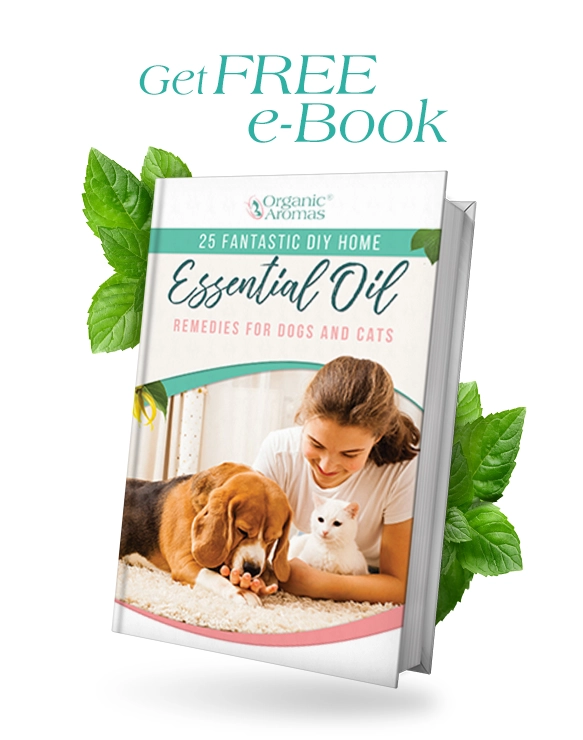
Sign Up to Get Your e-Book Here
Recognizing Unsafe Essential Oils for Cats
Tea tree oil is the most dangerous essential oil for cats, as it can cause severe adverse reactions such as ataxia, lethargy, salivation, tremors, and comas. Cats are more sensitive to essential oils than humans due to their lack of certain liver enzymes responsible for breaking down a variety of substances. Essential oils are gaining popularity among people. Some worth mentioning are bay, bergamot, birch, cinnamon, citronella, citrus, clove, eucalyptus, fir, juniper, mint, pennyroyal, peppermint, pine, wintergreen, and ylang-ylang oils..
To ensure your cat’s safety, avoid these essential oils toxic to cats and focus on using essential oils safe for cats, always following the appropriate guidelines and precautions to use essential oils safely.
Symptoms Indicative of Essential Oil Poisoning

If your cat is exposed to toxic essential oils, they may exhibit symptoms of essential oil poisoning, such as vomiting, lethargy, and respiratory distress. Immediate veterinary attention is necessary if your cat shows these symptoms, as it could be a sign of essential oil toxicity. Provide your veterinarian with information about the type of oil that caused the reaction and the form of exposure, such as licking, skin contact, or inhalation.
Monitoring your cat for any adverse reactions to essential oils is important, as early detection and intervention can help prevent potential health issues.
Responding to Essential Oil Emergencies
In case of essential oil poisoning, it’s necessary to contact your veterinarian or an emergency animal hospital immediately. Providing details about the oil and exposure method will help professionals assess the situation and provide the necessary treatment for your cat. If your cat has ingested essential oils, seek professional assistance right away, as this can lead to severe health issues.
Your veterinarian may conduct a physical examination, blood tests, and evaluate the impact of poisoning on your cat’s liver. They may provide oxygen support, insert an IV drip, or take other measures to eliminate the toxins and ensure your cat’s recovery.
Alternatives to Essential Oils for Pet Environments

If you’re looking for pet-safe alternatives to essential oils, consider using:
- Leucillin spray
- Manuka honey
- Pet-safe colloidal silver gel
- Simmer pots
- Rosemary water
These options can help create a pleasant environment for your cat without the risks associated with essential oils.
Simmer pots, for example, involve simmering water, spices, and other aromatic ingredients on the stove to generate a pleasant scent in the home. By incorporating pet-friendly ingredients, you can enjoy a fragrant home without exposing your cat to potentially hazardous essential oils.
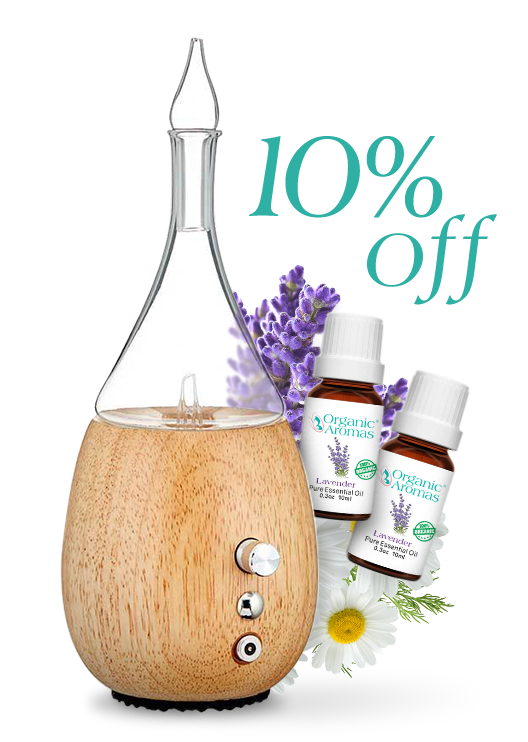
Join Now and Get a Coupon for 10% Off!
The Role of Veterinary Guidance in Using Essential Oils
Before using essential oils on or around your cat, consulting a veterinarian is necessary to ensure their safety and well-being. A veterinarian can evaluate the potential toxicity of certain oils, such as those containing phenols, which may cause liver failure and seizures in cats. Additionally, they can conduct studies to validate the effectiveness and safety of essential oil administration to cats.
Particularly, consulting a veterinarian before using essential oils on cats that are:
- pregnant or nursing
- aged
- have chronic health issues
- are kittens
is important. By seeking veterinary guidance, you can provide your cat with the benefits of essential oils without jeopardizing their health.
A Closer Look at Which Essential Oils are Safe for Cats
Geranium, thyme, and almond oil are examples of cat-safe essential oils that can offer unique benefits when used correctly and under veterinary guidance. It’s important to research and choose pet safe essential oils for all your furry friends.
Geranium Oil: A Natural Flea Repellent
Geranium oil, when diluted with a carrier oil, can be used as a natural flea repellent for cats. The primary components in geranium oil, such as citral and geraniol, act as natural repellents. To create a flea and tick spray for cats, you can combine 4 drops of geranium oil with one cup of water.
Moderate use of geranium oil is necessary and ensuring it is safe for external use on cats is important. By using geranium oil as a flea repellent, you can help protect your cat from these pesky invaders in a natural and effective way.
Thyme Oil: Antimicrobial Properties
Thyme oil is known for its antimicrobial properties, which have been shown to be effective against both gram-positive and gram-negative bacteria. It contains compounds such as carvacrol and thymol, which possess antimicrobial properties and have been found to be effective in combating multidrug-resistant bacteria. While there is no evidence to suggest that thyme oil can treat any specific infections in cats, its antimicrobial properties may be beneficial in certain cases when used safely and under veterinary guidance.
However, caution is required when using essential oils like thyme oil around cats, as not all essential oils are safe for feline use. Always consult a veterinarian before using thyme oil or any other essential oil on your cat.
Almond Oil: A Gentle Carrier Oil
Almond oil is a gentle carrier oil that can be used to dilute essential oils for safe topical application on cats. It is safe for external use and known for its moisturizing and healing properties, making it suitable for use on cats’ skin and fur. The advised ratio for using almond oil to dilute essential oils for cats is 1 drop of essential oil to 4 tablespoons of carrier oil.
While almond oil is generally safe for cats, some could be allergic or sensitive to it, so monitoring for any adverse reactions when using almond oil with your cat is necessary. By using almond oil as a carrier oil, you can ensure that essential oils are applied safely and effectively to your cat’s skin.
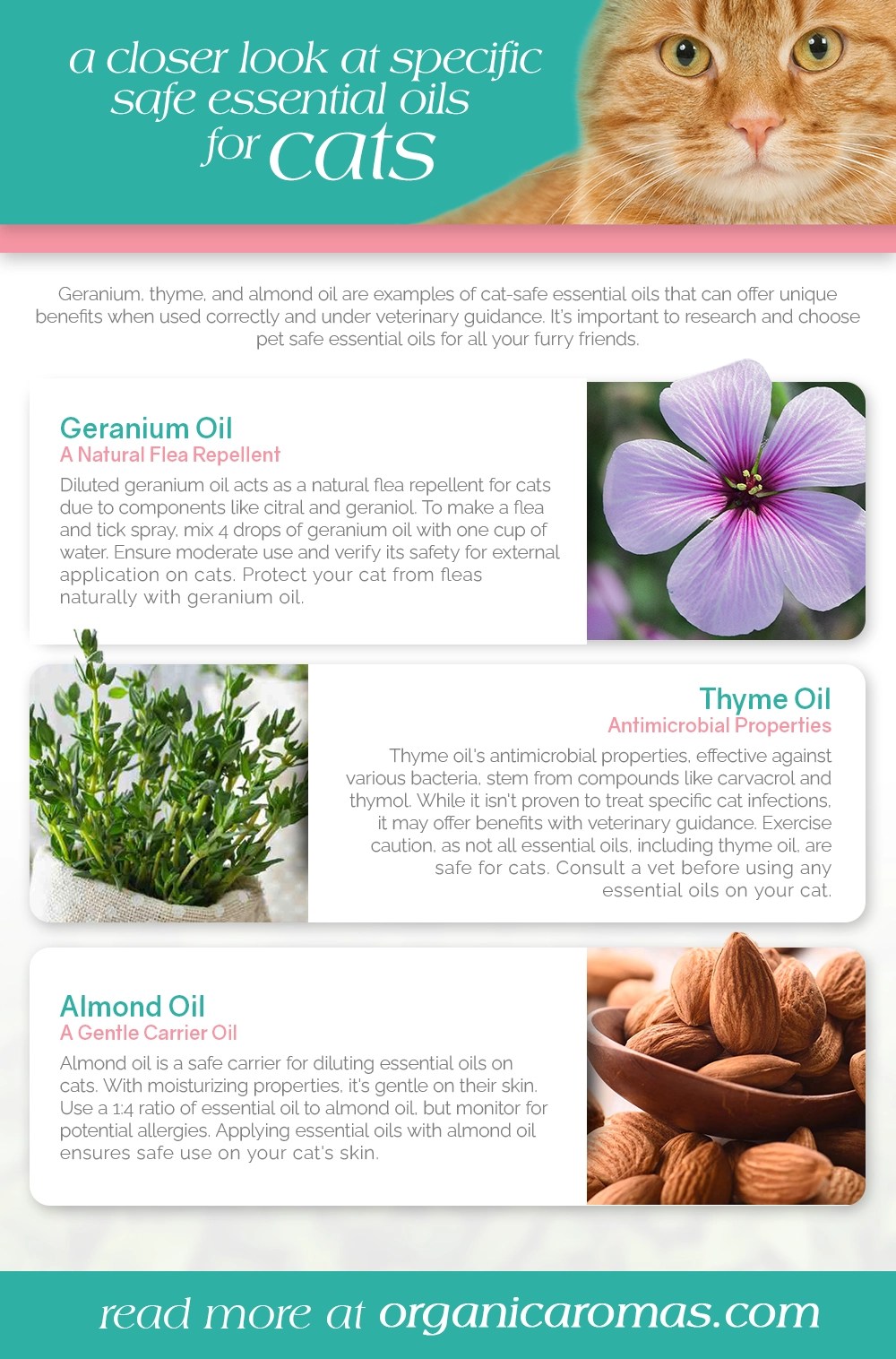
Maintaining a Safe Environment for Cats Around Essential Oils
For your cat’s safety around essential oils, store the oils out of reach, use them in low concentrations, and monitor your cat’s reaction to the oils. Signs of a cat’s adverse reaction to essential oils may include drooling, pawing at the face, difficulty breathing, watery eyes and/or nose, coughing, or wheezing. If you observe any of these symptoms, seek veterinary assistance immediately.
Controlling the concentration levels of essential oils in your cat’s environment is also important. Use heavily diluted essential oils and diffuse them at very low concentrations, avoiding areas frequented by your cat and limiting the duration of diffuser use. By taking these precautions, you can enjoy the benefits of essential oils while ensuring a safe and comfortable environment for your cat.
Summary
Essential oils can offer numerous benefits for cats when used safely and responsibly. By understanding the risks, recognizing unsafe essential oils, and consulting with a veterinarian, you can provide your cat with the advantages of essential oils without jeopardizing their health. Remember to dilute essential oils, use them in low concentrations, and monitor your cat’s reactions to ensure a safe and comfortable environment for your beloved feline friend.

Join Our Exclusive Member Club to get Big Discounts!
Frequently Asked Questions
Can I spray my cat with essential oils?
It is generally advised to avoid diffusing essential oils around cats as they can absorb the oils through their skin and it can potentially cause liver damage or even liver failure. Additionally, many essential oils are poisonous to cats and can be toxic with both ingestion and skin exposure. Thus, it is not recommended to spray your cat with essential oils.
Is peppermint oil toxic to cats?
Peppermint oil is toxic to cats, both when ingested and when inhaled. Skin exposure can also be dangerous. Birds are also at risk of toxicity due to this essential oil.
Is eucalyptus oil safe for cats to smell?
Eucalyptus oil and other essential oils can be toxic to cats when ingested, inhaled or exposed to their skin for a prolonged period of time. Therefore, it is generally recommended to avoid using eucalyptus essential oil around cats, as it can cause adverse health effects.
Essential oils that are safe for dogs?
To ensure safety for you and your pet, it’s best to work with a vet trained in essential oils use when selecting safe essential oils for your dog.
My cat has ingested essential oil. What should I do?
Take your cat to the nearest veterinarian or emergency veterinary hospital, or contact the ASPCA animal poison control right away for professional assistance.

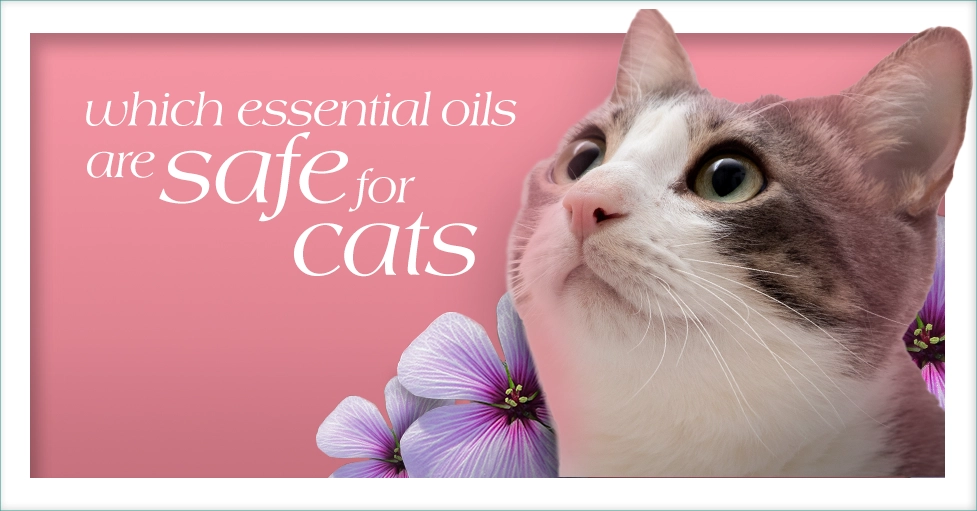
Eastern red cedar wood has been cited in the comments as safe for cats
There are different species of cedar
Also how the oils are processed etc is a factor
Off to try again to research
Very interesting.
Essential Scents Candles do let friendly candles and specialise in natural, researched ingredients and essential oils. With a certificate in petaromatherapy, find them on Etsy
There are many conflicting reports the only people who would know for certain whether an essential oil is safe or not for any pet would be the ones who ran clinical trials other than that it is only opinions. So I suggest look for studies that were conducted. Plain & simple.
Rosemary is toxic to cats. Any essential oil that has turpenes or phenols is toxic to their livers as they lack the ability to process them. Very very few oils are safe for cats. Rose, I believe is one. Not Rosemary. I doubt peppermint or cedar is safe. Do your own research. Those who make a buck selling oils seem to be passing on false information on the safety of essential oils.
Peppermint for cats?? Why would you spread this kind of misinformation online ?? That information is 100% false! Where do you get your info from???
Echoing the “peppermint oil is bad” comments. This post is incredibly reckless. Quite honestly, essential oils as a whole are potentially harmful to cats, and if you are responsible for an animal, your aromatic habitat should absolutely be secondary to your pet’s health.
In ‘essence’, your business is not compatible with pet owners and the ethical path is to accept and convey that they are not your intended clientele.
But hey, five stars and an A rating from the Better Business Bureau, am I right?
I find it quite worrying that every other site I have looked at on this subject, inc. vets and cat charities, cite peppermint as toxic to cats. Surely this company would be subject to legal action if somebody’s animal falls ill as a result of this misleading information about their products?
The ASPCA website has a list of essential oils that are toxic for cats. Please take this inaccurate post down or do more research and edit your post.
I just purchased a diffuser and some Lemongrass essential oil. I had read a list of oils that don’t make cats sick. Lemongrass was on that list now I just read it will make my cat sick. Can you help me Thanks GGress
My cat runs to my lemongrass bush first thing everyday going on 4 yrs. and started chowing down. My neighbors even comment on how often he is in that bush pot. I’m inclined to say lemongrass is safe for cats.
Lemongrass and Rosemary are NOT TOXIC for cats you guys.
I don’t know where you got that information but that is not true. ask your vet.
On the other hand, peppermint AND tea tree oils are toxic to cats. it will make them sick and some lethargic. With essential oils you need to be more aware with using them around cats than dogs because cats react to it a lot more than dogs because they are more sensitive to it.
Have you heard that Before people actually realized that oils started to affect animals the way they were, vets used peppermint essential oils to clean their instruments and tables ? Crazy right? So vets do not use that anymore.
Christopher Vecoli, Here’s an alternative for you—don’t own a pet if you’re too lazy or stupid to do your own research. Yes, we ARE going to slam the author for providing erroneous information which WILL result in the death of someone’s pet. The pet may not die immediately, it’s likely they’ll suffer a slow, painful death due to liver failure. Cedar is also toxic to cats, as is tea tree oil, citrus & most mints. Cats have very thin skin & toxins are easily absorbed. I wouldn’t diffuse anything around my cats.
everywhere i read peppermint no good, then i read its good. trouble w this is none of the approved smells good in diffuser.
So many conflicting reports of diffusing oils to use around cats.
The ones so far that I read that are safe:
is Cedarwood, Lemongrass and Basil.
Again, everything should be done in moderation. The room should not be enclosed and the cat should feel free to leave. I try not to use if my furry friend is sleeping on her favourite chair.
http://www.animaleo.info
From what I understand… I found an essential oil Vet on Facebook recently…
You can diffuse any essential oil around cats, as long as it’s an open area… IF the essential oil doesn’t agree with them, they have another room to go to….
They do have trouble with a lot of the citrus oils… so make sure to diffuse those in an open area where your cats can go to another room if they need to…
The caution lies in giving them essential oils internally, and topically…
I hope this makes sense… 🙂
I was very afraid of using them as well.. between everyone in our house, we have 5 cats…
Now, I’m not so freaked out… I can diffuse…. but I don’t put the oils ON my cats or give the oils TO them…
Just don’t diffuse in a close room where your cat cannot get out… Make sense? 🙂
IF you’d like to check this Vet out… just do a search on FB for:
Essential Oil Vet – Janet Roark, DVM
PS I don’t know her personally, I stumbled upon her information about a month ago… I’m very happy not to be so worried about my cats anymore… 🙂
I hope this helps….
Thank You for posting this. Very much help!
Many vets are starting to use essential oils to treat illness in cats, there are entire lines of products for cats based on essential oils. Please do real research before jumping on the fear mongering bandwagon about cats and oils. Find high quality oils, $5 anything is probably bad for your cat, and use them properly and your cat will thank you. I use oils in a diffuser and topically on my hairless cat that is six years old and she is like a kitten still. Perfect blood work and urinalysis results.
Here is a recent article on essential oils, cats, and the toxicity of them. The short of it: NEVER allow essential oils to get in the cats fur, skin, or mouth. Passive diffusion is the only safe way to diffuse in a home with cats.
https://www.petpoisonhelpline.com/blog/essential-oils-cats/
I use a diffuser in my room with my cat all the time and he loves it. He’ll go sit next to it when it’s going and enjoy rhe smell of mint or orange, and when I use vicks he lays on my chest and burys his nose in it. I’m fairly certain he’s fine, as he has been doing it since he was a kitten. So yeah. I gyess it is safe, he’s never gotten sick or anything resembling close to it.
Hello
Just to let you know peppermint oil " IS DANGERIOUS TO CAT" It can give them pneumonia ! Look it up…… please
I decided I want to use a diffuser for essential oils for myself.
And I don’t want to harm my cat. Most of the information I found online as to what is safe for cats and what is not is confusing as to what is safe for cats. I give up!
Word of CAUTION: peppermint oil IS NIT SAFE FOR CATS AND CAN CAUSE LIVER FAILURE. Please do the research. This article is not accurate
And they make cat litter with lavender? I love lavender because it helps me sleep, now I may have to be cautious about it. My cat is about 10 or older. I haven’t been an avid user of scents and oils, but I do gave an aroma therapy necklace that I will have to be careful in using. I guess the oils would be safe on your feet at night? I sell soy wax. I will be careful with the scents I choose. I just got a new warmer. I wanted to get fall scents. Would those work?
Thank you all! I’m too educated on essential oils and cats to risk harming my precious beloved cats. Their body’s are not like ours. Please protect your pets! Put the essential oil on the bottom of your feet and keep your cat in its oun bed or cat tree. You will both be happy and healthy. Ps don’t burn candles or use toxic plug ins !
I use vinegar cleans and kills fleas and bugs. My cat loves mint and vicks I try to keep her away from my oils
I had comment before, and no one seems to answer to my questions. I just bought a new diffuser and some new oils. I have a small dog and two cats, I have always used oils and diffusers as well as incense and scent candles. None of my pets has ever had any reactions to any. I had never knew of the dangers of EO and pets in general. I put my diffuser inside a closet in our guest bathroom far away from my pets, but the candles and incense has alway been lit in my living room. Maybe my pets had gotten used to those?
I’ve used Savory Chai in my diffuser, & Blue Raspberry.
Can anyone tell me if they are safe for cats, or point me to a website I can trust?
Now I am scared. Just bought oil and a diffuser and I am afraid that it will harm my four cats. Is there anything SAFE that I can use??
I can’t believe that catnip essential oil has not even been mentioned!! How much dilution is necessary for catnip oil and what do you dilute it with to be safe for the cat?
There is nothing but conflicting information on this subject.. so, what is the truth?
So there are plenty of DO NOT’s on here, but could someone please give a clear answer for the question of what EO’s are ok for CATS (not dogs)to rid fleas?
Let’s face it, flea medicine is harmful to animals and my cat gets sick for 3 days + after she has flea remedy at the Vet. So, obviously cats are sensitive to a lot more than what I am aware of. I would like to naturally rid her fleas without making her sick. Anybody? Thank you in advance.
Both rosemary and peppermint especially the latter one is extremely toxic to cats. There were many ones pointed out but nothing changed. This is reflects on how arrogant, irresponsible, ignorant and obstinate to whomever responsible for this absolute fault information.
Lemongrass and Peppermint are extremely toxic to cats, I honestly just dont want to use anything around my pets because im so scared about hurting them 🙁
I’m frustrated and confused. I want to use essential oils to benefit myself but I do not want to put my kitty at risk. Are there any essential oils that most people agree are safe?
I did not know that about their liver. Seems caution is advised, however..
My in/out cat has bad sinus blockage all it’s life. Vet says he can’t do a thing. Nose always stuffed, sounds horrible to hear it breathing.
I’ve safely used a small smidgen of vicks on the bridge of nose and rubbed in a underneath it once a week for years. It’s ate some naturally from that. It does seem to offer temporary relief.
I’ve had a kitten who I rescued in winter,there was a cat run over on our road who I presumed was it’s mother,it was in a ditch nearby. Only 4 weeks old,shivering 24/7 and almost dead of pneumonia. It’s lungs sounded BAD. Wouldn’t eat,drink, pained/exhausted to move. I forced hydrated it using syringes (no needle) full of store bought nutrients for the purpose and the same tea I drink by the boatload for lung issues myself if they occur in cold weather.
Kept it in a small bathroom, with a device that steams the oil enriched water (diffuser). I didn’t use much, but it was a tight confined space of eucalyptus and a very small amount of lavender. Your talking, 10 drops and 2 drops. I don’t know how many ml, but not much in the air. It took her weeks of my piss poor shoulder shrug icu, but she recovered and grew into a healthy cat. She’s likely the friendliest cat I’ve ever had, does not leave my side. Wants to be around me like a dog.
So I don’t know how deadly/dangerous it all is, little to no dosage/method/control info and the information is hard to find.
I, too, have seen lists of essential oils that are dangerous for cats and those listed here as safe are considered unsafe, as many have pointed out. While I appreciate the openness and transparency of this site for retaining these highly critical reviews, it is amazing that this article remains unchanged.
ALSO, Cid, you seem well-informed; can you share your source(s) for your information? If you are blocked from using a URL, then going around this by spelling out some of it seems to work at least for emails.
What is missing in these responses, sadly, is direction to a responsible resource that answers the question posed: Which oils ARE safe for our cats. Everyone acts like they are experts, slamming the author. And some arguments are consistent with what I’ve heard elsewhere. But no one offers an alternative solution.
I AM LOOKING FOR A RECIPE TO MAKE A FLEA AND TICK COLLAR FOR CATS THAT WILL IN NO WAY HARM THEM .aRE THERE ANY ESSENTIAL OILS I CAN USE ??
I just read Cedarwood will kill your cat unless it is Eastern red cedar wood is this correct
I’ve had indoor cats my entire adult life. I’ve never thought about essential oils harming them. I’ve used essential oils with my laundry, through a diffuser and used to (but no longer) burn candles. All my cats, with the exception of one (died at 12 due to asthma), have lived between the ages of 17 and 22. Maybe they were lucky and I am not questioning that essential oils can be harmful. Just use caution and do what you feel is safe for your pets.
Conflicting information and I have no answer to this question.
My friend’s cat died suddenly of kidney failure and no one knew why. She diffuses and sales the do Terra oils all the time.
Please don’t difuse oils anywhere near your cats. It can and most likely will eventually kill them .
And like some others have said, by time you notice anything might be wrong your beloved feline will be already sick and or dying.
I was dusting with peppermint oil and my cat showed a big interest in it, it’s the second time now this has happened so I did research and I’m reading keep kitty away from peppermint oil.. I’m wondering why my cat is going for it
TO: Marilyn Kowalis, In regards to “I have a humidifier that I usually run at night. Vicks makes a lavender tab to put in it, as well as the Vicks tab itself. Are these toxic to my 6 cats? They all sleep with me, but not all night.” – Absolutely YES!!!!! Vicks contains camphor which is incredibly dangerous for both dogs and cats!!! Just do a little research.
So, is anything safe? I need a safe deodorizer for shelter cats that end up a bit stinky.
Does anyone know if ‘ANY" essential oils are safe for cats? I have a diffuser but don’t want to use it until I know for sure
This information is false and can be very harmful to pets!!! Please take this article down. They obviously didn’t do their research. Many of the oils listed here are very toxic to cats!!! Do not trust the information in this article!!!
Is the writer of this post a cat-hater? Most of the oils listed as safe on this post are the ones that are MOST HARMFUL. How has this post not been taken down? Disgusting.
I have 9 cats and I use my diffuser all the time to make my house smell wonderful.
My kitties are around a lot of different essential oils and often for a long period of time and none are bothered at all.
I think the point is to not let them eat it or put it directly on their fur!
I agree this person has not done their research on the correct kind of proper oils NOT to diffuse. I did not do my research and lost one cat with kidney failure and now my second kitty is sickly. I stopped diffusing and he’s gaining weight. When I do diffuse it is for only 1/2 hour at a time.
This is absolutely incorrect and very harmful information! This needs to be taken down IMMEDIATELY! These oils are VERY DANGEROUS to cats! Take this down!